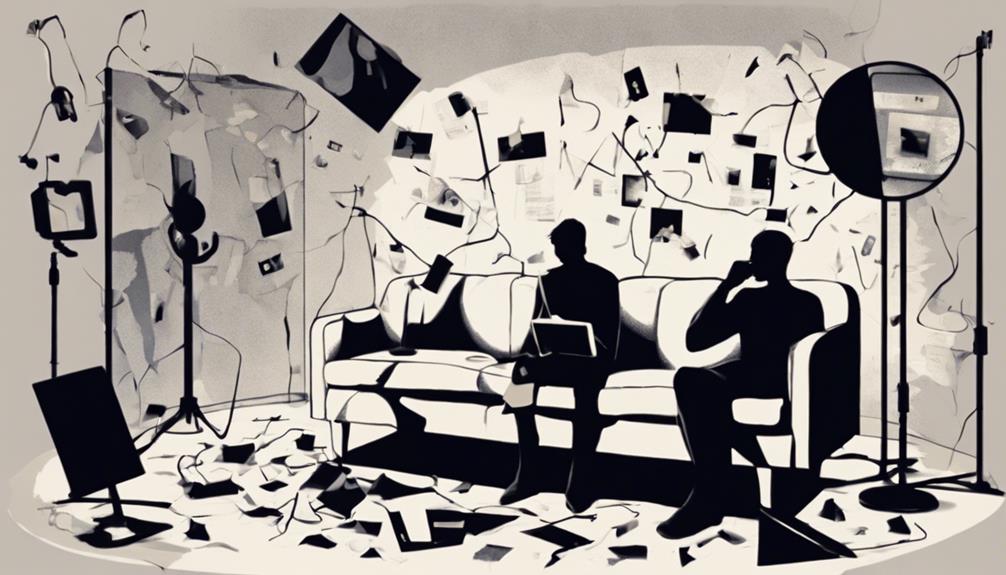Infidelity can deeply affect your mental health and relationships, leaving you with a whirlwind of emotions. It's important to acknowledge your feelings, whether it's betrayal, anger, or confusion. Lean on friends and family for support, and consider professional help to guide you through this tough time. Establishing boundaries with your partner can help regain control and foster open communication. Remember, rebuilding trust takes time, patience, and commitment from both sides. Focus on self-care practices like exercise and mindfulness to nurture your well-being. As you navigate this journey, you'll discover insights that can lead to healing and growth together.
Overview of Infidelity Statistics

Infidelity is more common than you might think, with studies showing that approximately 20-25% of married individuals admit to having cheated at least once in their lifetime. The prevalence of infidelity often varies based on demographic factors such as age, gender, and relationship duration.
For instance, younger individuals tend to report higher rates of infidelity compared to older couples, reflecting different relationship dynamics and societal norms. Gender also plays a role; while men historically have higher rates of reported cheating, recent studies suggest women's infidelity rates are on the rise, blurring traditional assumptions.
Additionally, individuals in longer-term relationships might experience infidelity differently, as the challenges and temptations can evolve over time. Understanding these statistics can help you realize that infidelity isn't a rare occurrence but rather a complex issue influenced by various factors.
If you or someone you know has been affected by infidelity, remember that you're not alone, and it's crucial to seek support. Gathering insights about the prevalence and demographic factors surrounding infidelity can empower you toward healing and rebuilding trust in your relationships.
Psychological Impact of Cheating
The emotional turmoil that follows cheating can profoundly affect your mental health, leading to feelings of betrayal, anger, and confusion. You might find yourself grappling with intense shame, questioning your self-worth and wondering what you could have done differently. This is a natural response, but it's vital to focus on shame management to heal.
As you navigate this painful experience, remember that your self-esteem can take a significant hit. It's common to feel like you're not enough or that you somehow caused the betrayal. Acknowledge these feelings, but also remind yourself that infidelity reflects the other person's choices, not your value.
Engaging in self-care practices, like journaling or talking to a trusted friend, can help you process your emotions. Surrounding yourself with supportive individuals who uplift you is essential.
Don't hesitate to seek professional help if you find your feelings overwhelming. A therapist can provide tools and strategies to rebuild your self-esteem and work through the pain.
Effects on Trust and Communication

Trust can be shattered after an affair, leaving you unsure of how to communicate openly with your partner again. The emotional fallout can create significant communication barriers, making it difficult to express your feelings or even discuss daily matters. You might find yourself questioning every word, fearing it could lead to more hurt or misunderstanding.
To navigate this challenging terrain, focus on trust rebuilding. Start by establishing a safe space for honest dialogue. It's crucial to set ground rules for conversations, ensuring both of you feel heard and respected. Timing matters; choose moments when you're both calm to discuss sensitive topics.
Be patient with yourself and your partner. Rebuilding trust takes time, and it's a gradual process. Acknowledge the hurt and don't shy away from discussing feelings of betrayal or insecurity. Use “I” statements to share your emotions without placing blame, which can foster understanding.
Emotional Consequences for Victims
Experiencing betrayal can leave you grappling with a whirlwind of emotions, from anger and sadness to confusion and self-doubt. This emotional trauma can feel overwhelming, as it shakes your sense of security and trust. You might find yourself questioning your worth or wondering if you missed signs that could have prevented the betrayal.
It's important to recognize that these feelings are normal reactions to such a painful experience. You may experience mood swings, anxiety, or even physical symptoms like fatigue and loss of appetite. Acknowledging your feelings is the first step in the healing process.
As you navigate through this emotional turmoil, finding effective coping mechanisms becomes essential. Whether it's journaling your thoughts, talking to a trusted friend, or seeking professional help, each step you take can help you regain a sense of control.
Coping Strategies for Betrayed Partners

Finding ways to cope after infidelity can help you navigate the intense emotions and regain a sense of stability in your life. Start by prioritizing self-care practices. Engage in activities that nurture your mental and emotional well-being, such as exercise, meditation, or journaling. These practices can provide a healthy outlet for your feelings and help you process your thoughts.
Don't hesitate to lean on your support networks. Reach out to friends or family members who can offer a listening ear or a comforting presence. Sometimes, sharing your experiences with those who care about you can lighten your emotional load. Consider joining a support group where you can connect with others who understand your pain and share coping strategies.
Establishing boundaries with your partner can also be a key part of your healing process. This allows you to regain a sense of control over your life. Remember, it's okay to seek professional help if you're struggling to cope. A therapist can guide you through your emotions and help you develop tailored coping strategies.
Embrace this journey of healing at your own pace, and be gentle with yourself along the way.
Rebuilding Relationships After Betrayal
Rebuilding a relationship after betrayal takes time and effort, but with open communication and a commitment to understanding each other's feelings, healing can begin.
The first step in this journey is acknowledging the hurt and pain caused by the betrayal. Both partners need to express their emotions honestly, allowing for a safe space to share feelings without judgment.
As you navigate the forgiveness process, remember that it's not about forgetting what happened but rather about choosing to move forward together. This may involve setting boundaries, discussing what led to the betrayal, and identifying ways to rebuild trust. Be patient with each other as you work through these difficult emotions.
Rebuilding intimacy is another vital aspect of healing. Start with small gestures—like holding hands or sharing a quiet evening together—to rekindle the connection. As trust gradually reestablishes, consider deeper conversations about desires and needs, fostering a sense of closeness.
Throughout this process, stay committed to being empathetic, open, and supportive. By doing so, you'll create a stronger foundation, ultimately transforming a painful experience into an opportunity for growth and renewed love.
Seeking Professional Help

Sometimes, despite your best efforts to navigate the aftermath of infidelity, you may find that seeking professional help can provide valuable support and guidance in your healing journey. Engaging in therapy can offer a safe space for you to express your feelings and process the complex emotions that arise after betrayal.
Counseling approaches vary, but many focus on communication, trust-building, and emotional healing. A skilled therapist can help you explore underlying issues while teaching you effective coping strategies. Whether you choose individual therapy or couples counseling, the therapy benefits can be profound. You'll gain insights into your emotions and behaviors, which can foster personal growth and improve your relationship dynamics.
Moreover, working with a professional can help you establish healthier patterns moving forward. You'll learn to navigate your feelings of anger, sadness, or confusion, and develop tools to rebuild trust. Remember, reaching out for help isn't a sign of weakness; it's a powerful step towards healing.
Embrace the journey, and know that support is available to guide you through this challenging time.
Conclusion
Steering through the aftermath of infidelity is challenging, but healing is possible.
By acknowledging your feelings and fostering open communication, you can begin to rebuild trust.
Remember, it's okay to seek support from friends, family, or professionals as you work through the emotional turmoil.
Prioritize self-care and give yourself the grace to heal at your own pace.
With time and effort, you can emerge stronger, whether that means rebuilding your relationship or finding peace on your own.
